Summary
Below, you can find the validated AFCCQ in the following languages (in alphabetic order):
- Albanian (validated for use in North Macedonia): AFCCQ_AL
- Australia English language: AFCCQ_Australia
- Dutch: AFCCQ_NL
- English: 2020 J Dikken AFCCQ – EN
- German: AFCCQ_DE
- Hebrew: AFCCQ_Hebrew
- Italian: AFCCQ_IT
- Japanese: AFCCQ-JP
- Macedonian: AFCCQ_MK
- New Zealand English: AFCCQ_NZE
-
-
- Link to the guide to running age-friendly cities in New Zealand: Resources for Aotearoa New Zealand Age friendly Network | Te Tari Kaumātua
-
-
- Polish: 2024 AFCCQ Polish
- Romanian: AFCCQ_RO
- Russian: AFCCQ_RU
Validation of the AFCCQ in Italy: Understanding Age-Friendliness from Older Adults’ Perspectives
To address the challenges of population ageing and urbanisation in Italy, a country with one of the oldest populations globally, the Age-Friendly Cities and Communities Questionnaire (AFCCQ) has been translated and validated for the Italian context. This study was conducted in three Italian cities: Venice, Verona, and Palermo, involving a representative sample of 1,213 older adults from November to December 2023. 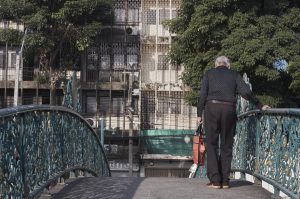
The Italian version of the AFCCQ was translated and validated by Michele Bertani, Researcher at Ca’ Foscari University of Venice, Department of Economics.
The publication of the validation and additional analysis based on the AFCCQ tool can be found here: Bertani, M., van Hoof, J., Dikken, J. (2025) Getting Older People’s Voices Heard: A Quantitative Study Using the Validated Italian Age-Friendly Cities and Communities Questionnaire in Venice, Verona and Palermo. Journal of Cross-Cultural Gerontology 40(2):209-234.
Link to the full paper (open access): https://doi.org/10.1007/s10823-025-09532-1
CONNECTED Generations, CONNECTED Cities: The Age-Friendly Vision
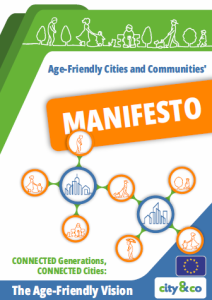
The City&Co consortium (https://cityco.snspa.ro/) proudly presents the “Age-Friendly Cities and Communities’ Manifesto. CONNECTED Generations, CONNECTED Cities: The Age-Friendly Vision.”
Drawing on data from the surveys held in 4 cities (The Hague, Wroclaw, Krakow and Bucharest) AFCCQ and photographic data collected through a geoportal, the City&Co project developed this manifesto in a co-creation workshop with older adults and policymakers from four cities held in October 2024 in Bucharest.
This Manifesto is a programmatic document that can be used to empower local and national organisations, municipalities, and policymakers to create age-friendly urban environments, where older adults feel welcomed and enjoy a better quality of life. The Manifesto outlines 10 key points that underpin older people and policymakers’ views on the age-friendly cities and communities’ framework, as stated by the World Health Organization (2007).
This manifesto is available in four languages: English, Dutch, Polish and Romanian, and can be downloaded here:
- English: Manifesto EN
- Dutch: Manifesto-NL
- Polish: Manifesto_PL
- Romanian: Manifesto_RO
Australia has validated the AFCCQ with 334 older people from the Greater Adelaide Region
To support age-friendly cities and communities and policymaking in Australia, the Age-Friendly Cities and Communities Questionnaire (AFCCQ) has been adjusted for Australian English and validated for use in this country through a survey conducted with 334 older people from the Greater Adelaide Region. The questionnaire has been produced by Dr Romy Wasserman and Dr Helen Barrie (University of South Australia) with Professor Veronica Soebarto (The University of Adelaide) in collaboration with Professor Joost van Hoof and Dr Jeroen Dikken of The Hague University of Applied Sciences.
Australia was an early adopter of the WHO’s AFCC programme in the City of Melville, WA in 2006. Since this time the AFCC movement has grown to incorporate cities and communities across the breadth of this large, diverse nation. This includes South Australia and its capital city Adelaide, where Dr Alex Kalache was ‘Thinker in Residence’ in 2010/11, fostering a deeper understanding of the WHO’s AFCC principles and approaches. At this time South Australia committed to becoming one of the first Age-Friendly States, aiming to incorporate age-friendly principles and a life course perspective into population health planning and state-wide health strategies. Link to the full paper (open access): Validating the age-friendly cities and communities questionnaire in Australia: Revealing five distinct groups of older people in Greater Adelaide – ScienceDirect
The AFCCQ Australia can be found here: AFCCQ_Australia

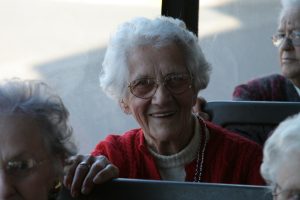
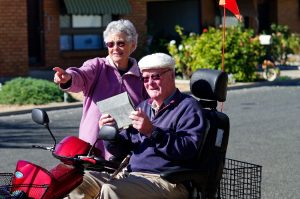
AFCCQ is also available for use in the Russian Federation in Russian
We are delighted to share the news that the translated and validated AFCCQ for use in the Russian Federation is now available. Russia has several cities that are members of the Global Network for Age-Friendly Cities and Communities of the World Health Organization, with the city of Saint Petersburg as the latest member to join the network in November 2024. In this project, scholars from The Hague University of Applied Sciences worked together with Prof Liliya Ziganshina of the Interregional Clinical Diagnostic Centre in Kazan in the Republic of Tatarstan and her colleagues. 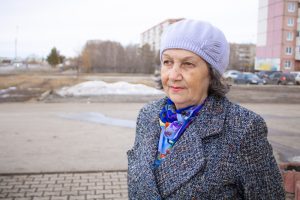
The Russian version of the AFCCQ can be found here: AFCCQ_RU
This publication of the validation can be found here: Ziganshina, L.E., Garaeva, A.F., Talipova, L.I., Khairullin, R.N., Dikken, J., van Hoof, J. (2025) Measuring the age-friendliness of cities in the Russian Federation: The translation, validation and application of the Age-Friendly Cities and Communities Questionnaire in the city of Kazan. Heliyon 11(1):e41100. https://doi.org/10.1016/j.heliyon.2024.e41100
AFCCQ is also available for use in Israel in Hebrew
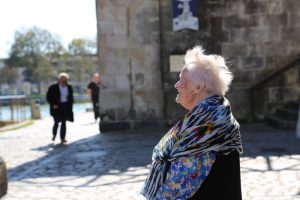 We are happy to share the news that the translated and validated AFCCQ for use in Israel is now available. The measure was administered in several cities that are members of the Global Network for Age-Friendly Cities and Communities of the World Health Organization. In this project, scholars from the Netherlands worked together with Prof Liat Ayalon of Bar-Ilan University, one of the Healthy Ageing 50 named by the UN Decade of Healthy Ageing [2021-2030]. In the coming months, the team will work on producing a second version of the AFCCQ in Arabic, a language with a special status under Israeli law, in collaboration with Dr Hanan AboJabel of the Hebrew University of Jerusalem.
We are happy to share the news that the translated and validated AFCCQ for use in Israel is now available. The measure was administered in several cities that are members of the Global Network for Age-Friendly Cities and Communities of the World Health Organization. In this project, scholars from the Netherlands worked together with Prof Liat Ayalon of Bar-Ilan University, one of the Healthy Ageing 50 named by the UN Decade of Healthy Ageing [2021-2030]. In the coming months, the team will work on producing a second version of the AFCCQ in Arabic, a language with a special status under Israeli law, in collaboration with Dr Hanan AboJabel of the Hebrew University of Jerusalem.
The Israeli version in Hebrew can be found here: AFCCQ_Hebrew
This publication of the validation can be found here: Ayalon, L., Dikken, J., van Hoof, J. (2024) The Age-Friendly Cities and Communities Questionnaire: A validation study of the Hebrew version in Israel. Heliyon 10(23): e39182. https://doi.org/10.1016/j.heliyon.2024.e39182
Photo: Freepik.com
Western Balkan countries connect and collectively work on the assessment of their age-friendliness (2024-2027)
On 27.11.2024, the official online kick-off of the Age-friendly Balkans Connected Network (ABC Network) took place. The project is warmly supported by the World Health Organization, represented by Dr. Thiago de Sa and Dr. Yongyie Yon. The realisation of age-friendly environments is one of the pillars of the UN Decade of Ageing, and the WHO calls on member states to put steps forward to it.
The ABC Network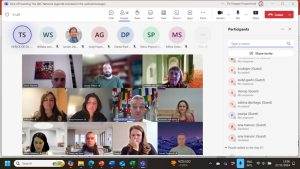 seeks to (1) form regional knowledge and action eco-systems through further capacity-building in the Western Balkans and (2) provide regional cities with an instrument for a baseline assessment of age-friendliness. The Network, its ecosystems and tools, are a resource for making action plans, decision making and implementation concerning age-friendliness, as well as serve as a sustainable past performance in future grant applications.
seeks to (1) form regional knowledge and action eco-systems through further capacity-building in the Western Balkans and (2) provide regional cities with an instrument for a baseline assessment of age-friendliness. The Network, its ecosystems and tools, are a resource for making action plans, decision making and implementation concerning age-friendliness, as well as serve as a sustainable past performance in future grant applications.
The Netherlands and North Macedonia have been collaborating in this field since 2022, which forms the basis for the ABC Network. Partners of Mother Teresa University in Skopje (MTU) have asked to join our efforts: the Institute for Social Activities in Skopje sees the age-friendly agenda and research at THUAS as a logical next step for a better understanding and representation of all subgroups in their ethnically diverse city. Universities in bordering nations, including Kosovo and Albania, have indicated their i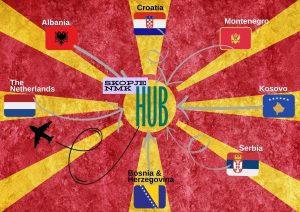 nterest to join efforts. To date, the city of Tuzla in Bosnia and Herzegovina is currently the only member city of the Global Network for Age-friendly Cities and Communities in the Western Balkans, with other cities having plans to join too. They called for the existing research and capacity-building efforts at MTU to be extended to other parts of the Western Balkans. This includes Tuzla in Bosnia and Herzegovina, which joined the network in 2023. It is currently the only member city in the Western Balkans, with Podgorica having plans to join.
nterest to join efforts. To date, the city of Tuzla in Bosnia and Herzegovina is currently the only member city of the Global Network for Age-friendly Cities and Communities in the Western Balkans, with other cities having plans to join too. They called for the existing research and capacity-building efforts at MTU to be extended to other parts of the Western Balkans. This includes Tuzla in Bosnia and Herzegovina, which joined the network in 2023. It is currently the only member city in the Western Balkans, with Podgorica having plans to join.
ABC Network has the following partners:
- The Hague University of Applied Sciences, Research Group of Urban Ageing (coordinator)
- AFEdemy, Academy on age-friendly environments
- University Mother Teresa, Faculty of Social Science, Skopje
- University of Split
- University of Novi Sad, Faculty of Sciences
- University of Montenegro
- University of Tirana
- University of Tuzla
- University of Mostar
- University of Prishtina
Objectives:
- To build local age-friendly ecosystems in the Western Balkans, by facilitating mutual learning from different contexts.
- To translate and cross-culturally validate the AFCCQ-NL and to conduct surveys in the participating cities.
Work plan:
- Capacity building in the ABC Network takes place through Mutual learning (ML), which is an implicit aspect of participatory research. ML refers to collaboration and knowledge-sharing between actors from similar organisations, or with a common interest from different settings [Robbertson et al. 2014].
- National versions of the AFCCQ are to be developed for use in the consortium countries. We follow the steps of the COSMIN protocol (COnsensus-based Standards for selection of health Measurement INstruments).
Expected outcomes:
- Formats & procedures for mutual learning visits; Written best practices on cross-cultural research design
- Updated manual for data collection and statistics (English); Top-up questions for consortium partners; Individual quantitative local and joint reports on the age-friendliness of the cities; National versions of the AFCCQ.
AFCCQ is also available for use in Poland in the Polish language
We are happy to share an AFCCQ translated and validated in Polish, which also can support age-friendly cities and communities and policymaking in Poland.
The Polish partners in the City&Co project recently published their findings with the validation of the AFCCQ in Wroclaw and Krakow. Their findings show that people’s socio-economic status, living arrangements and health situation play an important role in how they experience city life. The results in both cities highlight the value of quantitative city evaluation in designing and better monitoring urban policies following an age-friendly agenda. The most important finding of particular relevance to the public age-friendly policy in Poland is to secure the need for the older person to receive assistance with daily activities and mobility, especially among those who do not see the positive aspects of living in an age-friendly city.
In Poland, the first quantitative assessment tool for measuring age-friendliness – the AFCCQ (Age-Friendly Cities and Communities Questionnaire) was done for two cities, Kraków and Wrocław, which both belong to Global Network of Age-friendly Cities and Communities of the WHO (GNAFCC).
The Polish versions of the AFCCQ can be found here: 2024 AFCCQ Polish.
This publication of the validation and additional analysis based on the AFCCQ tool could be found here: Link. Perek-Białas, J. M., Skórska, P., Maj, M., Kazak, J. K., Dikken, J., & van Hoof, J. (2024). The experienced age-friendliness in two Polish cities: An in-depth analysis of the views of older citizens. Habitat International, 153, 103201
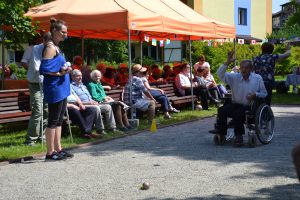
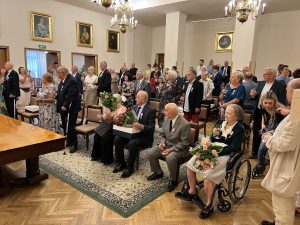

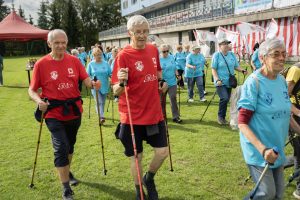
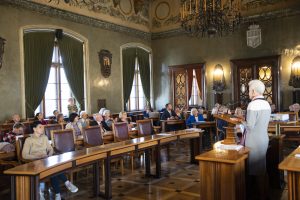
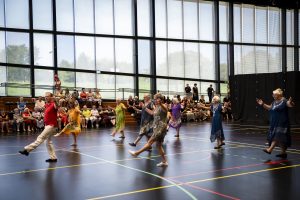
The work was based upon work from the project City&Co: Older Adults Co-Creating a Sustainable Age-friendly City (JPI project number 99950200). Link. This project was funded by the Taskforce for Applied Research (UTC.01.1), National Science Centre (UMO-2021/03/Y/HS6/00213), and Executive Agency for Higher Education, Research, Development and Innovation Funding (UEFISCDI) (Contract nr: 298 ⁄ 2022), as part of ERA-NET Cofund Urban Transformation Capacities (ENUTC), co-funded by the European Union’s Horizon 2020 research and innovation programme under Grant Agreement No. 101003758. Additional support was obtained from the Strategic Program Excellence Initiative of the Jagiellonian University, Kraków.
AFCCQ in German language validated in Oldenburg
To support age-friendly cities and communities and policymaking in Germany, the Age-Friendly Cities and Communities Questionnaire (AFCCQ) has been adjusted for Germany and validated for use in this country through a survey conducted with 907 older people from the city of Oldenburg. 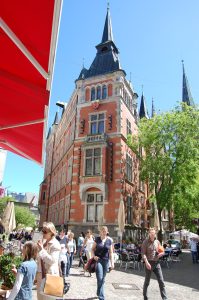
As part of a cooperation between the University of Oldenburg, City of Oldenburg, and Körber-Stiftung (Hamburg), the questionnaire was translated and validated by Professor Kathrin Boerner and Adele Grenz (Carl von Ossietzky University of Oldenburg), Professor Moritz Hess (University of Applied Sciences Niederrhein), and Dr Michael Weinhardt (DZA, German Centre for Gerontology) in collaboration with Professor Joost van Hoof and Dr Jeroen Dikken of The Hague University of Applied Sciences. The original questionnaire – the AFCCQ – was launched in The Hague 2020. This instrument consists of 23 items that can assist communities in collecting baseline data relating to their town or city to understand how age-friendly their local community is. The German version of the AFCCQ can be found here. AFCCQ_DE
Photo: Rathaus of Oldenburg. Stadt Oldenburg (Germany)
AFCCQ is also available for use in New Zealand
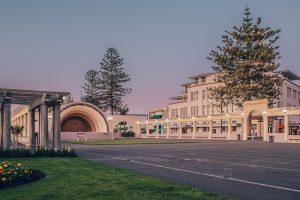 Photo credits: Napier City Council
Photo credits: Napier City Council
To support age-friendly cities and communities and policymaking in New Zealand, the Age-Friendly Cities and Communities Questionnaire (AFCCQ) has been adjusted for New Zealand English and validated for use in this country through a survey conducted with 354 older people from the city of Napier. The questionnaire has been produced by Professor Stephen Neville (Te Pūkenga), Michele Grigg (Napier City Council) and Karen Piercy (Office for Seniors) in collaboration with Professor Joost van Hoof and Dr Jeroen Dikken of The Hague University of Applied Sciences. The New Zealand Government is an affiliate and Napier City a member of the World Health Organization’s Global Network of Age friendly Cities and Communities.
In 2020, The Hague launched the first quantitative assessment tool for measuring age-friendliness – the AFCCQ. This instrument consists of 23 items that can assist communities in collecting baseline data relating to their town or city to understand how age-friendly their local community is.
The New Zealand version of the AFCCQ can be found here. Link: AFCCQ New Zealand final sept 2024
AFCCQ is available for use in North Macedonia in the Macedonian and Albanian languages
 To support age-friendly cities and communities and policymaking in North Macedonia, the AFCCQ has been translated into Macedonian and Albanian, and validated by Dr Daniel Pavlovski and Dr Elisabeta Bajrami Ollogu of Mother Teresa University.
To support age-friendly cities and communities and policymaking in North Macedonia, the AFCCQ has been translated into Macedonian and Albanian, and validated by Dr Daniel Pavlovski and Dr Elisabeta Bajrami Ollogu of Mother Teresa University.
Overall, older adults in Skopje experience the age-friendliness of the city as neutral (in seven out of nine domains). The best score (“slightly satisfied”) was found in the domain of Housing domain, which was rated positive in all ten municipalities. The lowest total score (“slightly dissatisfied”) was found in the domain of Outdoor spaces and buildings, which received negative scores in eight out of ten municipalities. In five out of nine domains, differences were observed between the Albanian and Macedonian communities. The Albanian sample has slightly higher scores in two domains: 1) Housing and 2) Civic Participation and Employment, while the Macedonian sample scored higher in three domains: 1) Communication and Information; 2) Outdoor Spaces and Buildings and 3) Transportation. Hierarchical cluster analysis further revealed the presence of six distinct age-friendly typologies that can be used for a better understanding of subpopulations in the city and draft policies and action programs on the city level.
In 2020, The Hague launched the first quantitative assessment tool for measuring age-friendliness – the AFCCQ (Age-Friendly Cities and Communities Questionnaire). This instrument consists of 23-items that can assist scholars, municipalities and local authorities to collect baseline data relating to their town or city to understand how age-friendly their local community is.
In 2022, external funding was awarded by the Taskforce for Applied Research, as part of ERA-NET Cofund Urban Transformation Capacities (ENUTC) for the project – City&Co: Older Adults Co-Creating a Sustainable Age-friendly City. As a member of COST Action NET4Age-Friendly, Dr Pavlovski of Mother Teresa University joined forces of the City&Co consortium and validated the AFCCQ for use in the multi-ethnic and multi-cultural city of Skopje, the capital of North Macedonia.
The North Macedonian versions of the AFCCQ can be found here: W2404 0720 Questionnaire Macedonisch V3 and 2024 AFCCQ Albanian language.
The paper on the validation of the instrument in Skopje can be found here: How older adults experience the age-friendliness of Skopje: Results of the validation of the AFCCQ for use in North Macedonia and a representative survey – ScienceDirect
 AFCCQ is available in the Japanese language
AFCCQ is available in the Japanese language
According to the World Economic Forum, Japan has the oldest population in the world. More than 1 out of 10 people are aged 80 years or over in 2023. To support age-friendly cities and communities and policymaking in the country, the AFCCQ has been translated into Japanese and validated by a Japanese consortium.
The findings indicate that Japan lacks “outdoor spaces and buildings”. Additionally, the evaluation of “housing”, “community support and health services”, and “transportation” in populated municipalities in the past five years was found to be significantly higher than that in depopulated ones. Age-friendliness is significantly affected by the AFCCQ total score based on “housing”, “social participation”, “community support and health services”, “transportation”, and “financial situation” evaluations.
The full AFCCQ can be found here: AFCCQ in Japanese language.
AFCCQ available in the English, Dutch and Romanian language
Update April 2024
The Age-Friendly Cities and Communities Questionnaire is being validated and used in multiple countries. For now the following – validated – AFCCQ’s are available in:
- English: Agefriendly Cities Questionnaire
- Dutch: AFCCQ in Dutch language
- Romanian: AFCCQ in Romanian language
The AFCCQ can be used for research purposes with reference to the source: https://www.mdpi.com/1660-4601/17/18/6867/pdf.

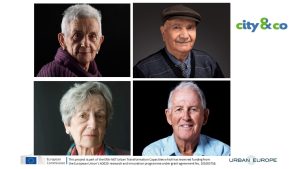 Update September 2023
Update September 2023
Validation of the AFCCQ: full speed ahead
In 2020, The Hague launched the first quantitative assessment tool for measuring age-friendliness – the AFCCQ (Age-Friendly Cities and Communities Questionnaire). This instrument consists of 23-items that can assist scholars, municipalities and local authorities to collect baseline data relating to their town or city to understand how age-friendly their local community is. The original AFCCQ is available in Dutch and British English.
In 2022, external funding was awarded by the Taskforce for Applied Research, as part of ERA-NET Cofund Urban Transformation Capacities (ENUTC) for the project – City&Co: Older Adults Co-Creating a Sustainable Age-friendly City – in collaboration with the Jagiellonian University in Kraków (Professor Perek-Białas),the Wrocław University of Environmental and Life Sciences (Professor Kazak) and the National University of Political Studies and Public Administration (Dr Ivan) in Bucharest in order to cross-culturally validate the AFCCQ for use in Poland and Romania. Additionally, and concurrently, Dr Özer and her team from Istanbul Sabahattin Zaim University in Turkey were conducting the validation of the AFCCQ and the Turkish version was published in 2022.
Across the three validation sites (Poland, Romania, Turkey) to date, findings are demonstrating successful and positive insights that the AFCCQ tool can be used at a national level. This sets out the pathway to impact of this work enabling municipalities, local authorities and researchers the opportunity to measure age-friendliness in a specific area, with a view to changing strategic resources, planning and decision making to enhance the physical environment better for all residents.
Further validations have followed in 2022 across different countries. In North Macedonia, work is led by Dr Pavlovski at the University Mother Teresa in Skopje. Dr Barrie and Professor Soebarto are leading the Australian version of the AFCCQ and are based at the University of South Australia and the University of Adelaide in Adelaide, Australia respectively. All sites are aiming to validate the AFCCQ for use in the multi-cultural cities of Skopje and the Greater Adelaide Metropolitan area. Professor Ziganshina from the Kazan State Medical University has validated the AFCCQ in Tatarstan located in the Russian Federation employing an intergenerational approach.
Additional teams and collaborations have been undertaken across Europe and the Middle East. Initially, a team from Portugal, led by Dr Barata of the Instituto Superior Miguel Torga in Coimbra, is currently undertaking the validation process for the Portuguese version of the AFCCQ. And in Israel, the Hebrew version of the AFCCQ is led by Professor Ayalon from Bar Ilan University, who has collected data from four Israeli cities (Tel Aviv, Kfar Saba, Netanya, Jerusalem). Similarly, an Italian version of the AFCCQ is underway and is led by Dr Bertani of the Ca’ Foscari University of Venice. Data collection is currently underway across three Italian cities, Venice, Verona, and Naples, in order to validate the AFCCQ for use in Italy. A Great Britian and Ireland version of the AFCCQ is currently underway and led by Dr Marston from The Open University in Milton Keynes in the United Kingdom. She is conducting a nationwide validation for the AFCCQ and findings are anticipated in early 2024.
A further two more validations are being undertaken by PhD candidates: Ms. Aija Ozola of Riga Stradins University is working on a Latvian version of the AFCCQ, and Mr. Tang Linxi of Universiti Sains Malaysia is coordinating the validation of the AFCCQ for the People’s Republic of China Shandong Province.
We are excited to report that there are more countries who are expected and we invite scholars to join this consortium and joint collaboration effort to validate the AFCCQ in their country.
Reference: Özer, G. Bahçecioğlu Turan & N. Teke (2022) Agefriendly cities and communities questionnaire: A research on Turkish validity and reliability. Archives of Environmental & Occupational Health, DOI: 10.1080/19338244.2022.2061397
Launch of the AFCCQ
In early 2020, the municipality of The Hague awarded the consortium consisting of The Hague University of Applied Sciences, Hulsebosch Advies and AFEdemy to develop a questionnaire and run a representative survey on the perceived age-friendliness of the city among its older citizens. Part of this survey was the development of a validated questionnaire, which allows for an assessment of perceived age-friendliness. To do justice to the super-diversity of the population of The Hague, the municipality also wanted a representative number of older Western and non-Western immigrants to be included in the sample.
The consortium developed and validated a total of 64 questions to measure the whole construct of age-friendly cities. The result is the AFCCQ with 23 questions. More information: The questionnaire is free to use in Dutch and English. It might be necessary to validate it culturally.
Key facts
Main target group: Older people in general
Sector(s): Health, Housing, Information and communication, Long-term care, Transportation, Urban development
Other sector(s): social inclusion
Desired outcome for older people:
Learn, grow and make decisions
- Ageism
- Accessibility
- Ageing in place
- Inclusion
- Participation

